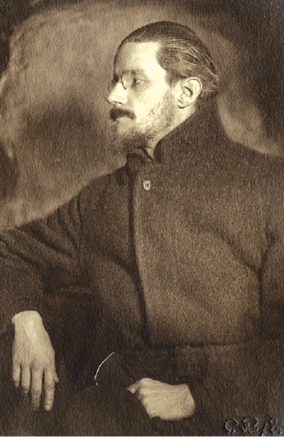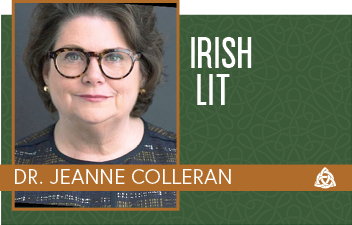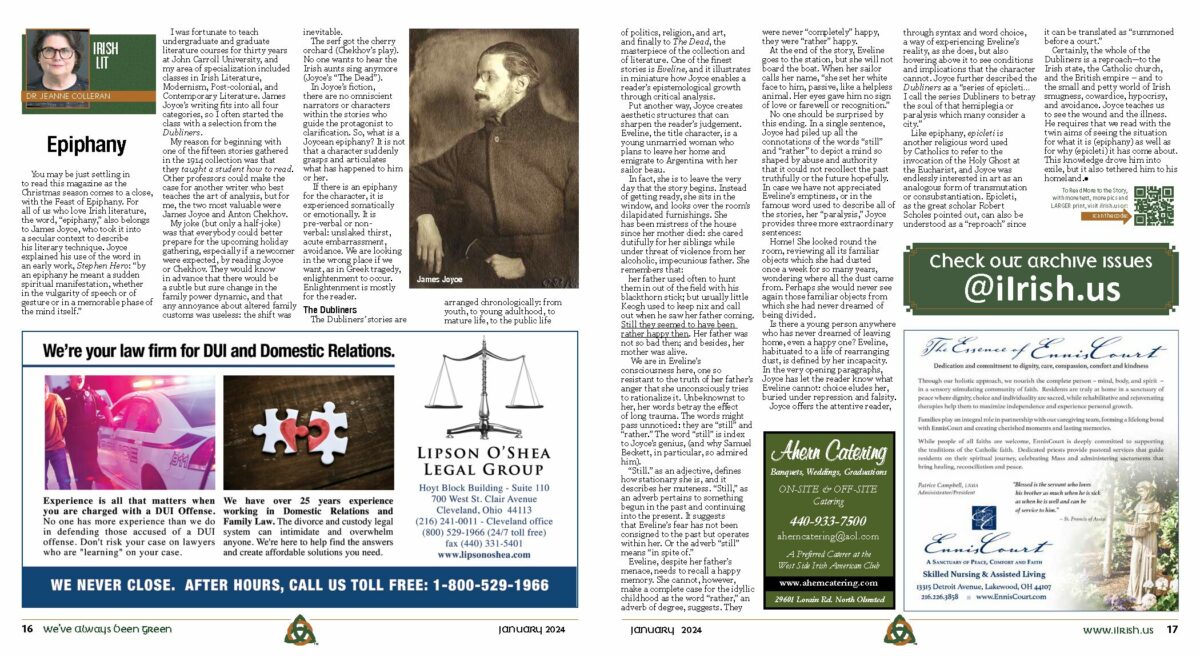

By Dr. Jeanne Colleran
You may be just settling in to read this magazine as the Christmas season comes to a close, with the Feast of Epiphany. For all of us who love Irish literature, the word, “epiphany,” also belongs to James Joyce, who took it into a secular context to describe his literary technique. Joyce explained his use of the word in an early work, Stephen Hero: “by an epiphany he meant a sudden spiritual manifestation, whether in the vulgarity of speech or of gesture or in a memorable phase of the mind itself.”
I was fortunate to teach undergraduate and graduate literature courses for thirty years at John Carroll University, and my area of specialization included classes in Irish Literature, Modernism, Post-colonial, and Contemporary Literature. James Joyce’s writing fits into all four categories, so I often started the class with a selection from the Dubliners.
My reason for beginning with one of the fifteen stories gathered in the 1914 collection was that they taught a student how to read. Other professors could make the case for another writer who best teaches the art of analysis, but for me, the two most valuable were James Joyce and Anton Chekhov.
My joke (but only a half-joke) was that everybody could better prepare for the upcoming holiday gathering, especially if a newcomer were expected, by reading Joyce or Chekhov. They would know in advance that there would be a subtle but sure change in the family power dynamic, and that any annoyance about altered family customs was useless: the shift was inevitable.
The serf got the cherry orchard (Chekhov’s play). No one wants to hear the Irish aunts sing anymore (Joyce’s “The Dead”).
In Joyce’s fiction, there are no omniscient narrators or characters within the stories who guide the protagonist to clarification. So, what is a Joycean epiphany? It is not that a character suddenly grasps and articulates what has happened to him or her.
If there is an epiphany for the character, it is experienced somatically or emotionally. It is pre-verbal or non-verbal: unslaked thirst, acute embarrassment, avoidance. We are looking in the wrong place if we want, as in Greek tragedy, enlightenment to occur. Enlightenment is mostly for the reader.
The Dubliners
The Dubliners’ stories are arranged chronologically: from youth, to young adulthood, to mature life, to the public life of politics, religion, and art, and finally to The Dead, the masterpiece of the collection and of literature. One of the finest stories is Eveline, and it illustrates in miniature how Joyce enables a reader’s epistemological growth through critical analysis.
Put another way, Joyce creates aesthetic structures that can sharpen the reader’s judgement. Eveline, the title character, is a young unmarried woman who plans to leave her home and emigrate to Argentina with her sailor beau.
In fact, she is to leave the very day that the story begins. Instead of getting ready, she sits in the window, and looks over the room’s dilapidated furnishings. She has been mistress of the house since her mother died: she cared dutifully for her siblings while under threat of violence from her alcoholic, impecunious father. She remembers that:
her father used often to hunt them in out of the field with his blackthorn stick; but usually little Keogh used to keep nix and call out when he saw her father coming. Still they seemed to have been rather happy then. Her father was not so bad then; and besides, her mother was alive.

We are in Eveline’s consciousness here, one so resistant to the truth of her father’s anger that she unconsciously tries to rationalize it. Unbeknownst to her, her words betray the effect of long trauma. The words might pass unnoticed: they are “still” and “rather.” The word “still” is index to Joyce’s genius, (and why Samuel Beckett, in particular, so admired him).
“Still.” as an adjective, defines how stationary she is, and it describes her muteness. “Still,” as an adverb pertains to something begun in the past and continuing into the present. It suggests that Eveline’s fear has not been consigned to the past but operates within her. Or the adverb “still” means “in spite of.”
Eveline, despite her father’s menace, needs to recall a happy memory. She cannot, however, make a complete case for the idyllic childhood as the word “rather,” an adverb of degree, suggests. They were never “completely” happy, they were “rather” happy.
At the end of the story, Eveline goes to the station, but she will not board the boat. When her sailor calls her name, “she set her white face to him, passive, like a helpless animal. Her eyes gave him no sign of love or farewell or recognition.”
No one should be surprised by this ending. In a single sentence, Joyce had piled up all the connotations of the words “still” and “rather” to depict a mind so shaped by abuse and authority that it could not recollect the past truthfully or the future hopefully. In case we have not appreciated Eveline’s emptiness, or in the famous word used to describe all of the stories, her “paralysis,” Joyce provides three more extraordinary sentences:
Home! She looked round the room, reviewing all its familiar objects which she had dusted once a week for so many years, wondering where all the dust came from. Perhaps she would never see again those familiar objects from which she had never dreamed of being divided.
Is there a young person anywhere who has never dreamed of leaving home, even a happy one? Eveline, habituated to a life of rearranging dust, is defined by her incapacity. In the very opening paragraphs, Joyce has let the reader know what Eveline cannot: choice eludes her, buried under repression and falsity.
Joyce offers the attentive reader, through syntax and word choice, a way of experiencing Eveline’s reality, as she does, but also hovering above it to see conditions and implications that the character cannot. Joyce further described the Dubliners as a “series of epicleti… I call the series Dubliners to betray the soul of that hemiplegia or paralysis which many consider a city.”
Like epiphany, epicleti is another religious word used by Catholics to refer to the invocation of the Holy Ghost at the Eucharist, and Joyce was endlessly interested in art as an analogous form of transmutation or consubstantiation. Epicleti, as the great scholar Robert Scholes pointed out, can also be understood as a “reproach” since it can be translated as “summoned before a court.”
Certainly, the whole of the Dubliners is a reproach—to the Irish state, the Catholic church, and the British empire – and to the small and petty world of Irish smugness, cowardice, hypocrisy, and avoidance. Joyce teaches us to see the wound and the illness. He requires that we read with the twin aims of seeing the situation for what it is (epiphany) as well as for why (epicleti) it has come about. This knowledge drove him into exile, but it also tethered him to his homeland.




Find this column and other Dr, Colleran Irish Lit Columns HERE!
*Dr. Jeanne Colleran, Ph.D is Professor Emeritus of English. At John Carroll University she served as Dean of the College of Arts and Sciences and as the Provost and Academic Vice President. At Loyola University of Chicago, she worked with the Loyola Rule of Law Institute in the School of Law.
A scholar of modern and contemporary literature, she has published a book, an edited collection, and some three dozen articles concerning literature and society. She has lectured in Ireland, South Africa, England, United States, France, Canada, Belgium, and The Netherlands. She taught undergraduate and graduate courses in Irish Literature. She may be reached at [email protected]
ends


Monthly newsmagazine serving people of Irish descent from Cleveland to Clearwater. We cover the movers, shakers & music makers each and every month.
Since our 2006 inception, iIrish has donated more than $376,000 to local and national charities.
GET UPDATES ON THE SERIOUS & THE SHENANIGANS!